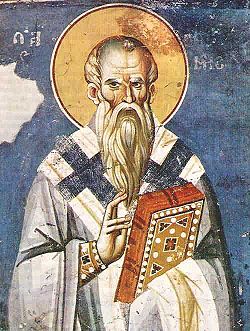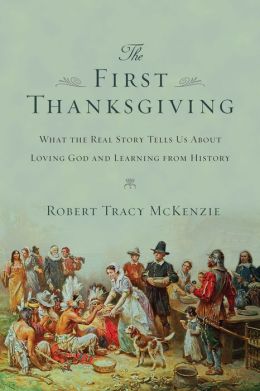Robert Tracy McKenzie is professor and chair of history at Wheaton College. He taught for many years at the University of Washington where he was the holder of the Donald W. Logan Endowed Chair in American History. He is the author of One South or Many? Plantation Belt and Upcountry in Civil War-Era Tennessee (Cambridge University Press) and Lincolnites and Rebels: A Divided Town in the American Civil War (Oxford University Press). He blogs at http://faithandamericanhistory.wordpress.com.
The following is an interview with Professor McKenzie and is based on his recent book, The First Thanksgiving: What the Real Story Tells Us about Loving God and Learning from History (InterVarsity Press).
* What was the spark(s) which motivated you to write this book?
There were two, really. At the most foundational level was a new sense of vocation. After two decades of writing primarily for other specialists in my field (which is what scholars in the Academy are trained to do and rewarded for doing), I began to sense a call to write more directly for the church, to enter into conversation with believers on the question of what it means to love God with our minds. More directly, the inspiration for this book was an invitation from my church several years ago to give a talk on the first Thanksgiving. In preparing for it, it dawned on me that the topic was a wonderful way to engage Christians interested in history and broach crucial questions in the process. I don’t think I’ve ever met someone interested in history who was first drawn to the past by a piece of dry academic scholarship. What initially captivates us is the stories. I came to realize that the story of the First Thanksgiving, retold faithfully, raises all kinds of important questions about what it means for to think “Christianly” about the past.
* Mark Noll points to the incarnation of Jesus as a key reason why Christians ought to seek to understand the past. Would you elaborate a bit on Noll’s observation?
In Jesus Christ and the Life of the Mind, Noll writes, “If it is true that the Word became flesh, it must be true that the realm that bore the Word, the realm of flesh, is worthy of the most serious consideration.” In other words, the incarnation of Jesus gives great dignity to the material world and to the human story that Jesus became a part of and identified with. Elsewhere, Noll has observed that, if we take seriously the Christian teaching that God is sovereign over history, then there is a sense in which the unfolding of human history is a part of his revelation to mankind. This strikes me as another powerful reason for giving careful attention to history.
* True education, as the ancient Greeks understood it, is painful. It is painful because true education causes us to confront truths which necessarily force us to reevaluate our cherished beliefs. So I wonder, since you are writing about the cherished beliefs of Christians, how many have gotten angry at you for what you wrote?
No one has attacked me yet, but that may be because the folks most likely to be offended haven’t read it yet. By and large, Christian historians stopped writing for Christians outside the Academy long ago, so if Christians in the pews are a bit suspicious of us, we have given them reason to be so. This is why one of the things I tried to do in the book was to identify myself openly and immediately as an evangelical Christian. This will not spare me from criticism from Christian readers, but I did want readers to think of me as coming alongside them rather than confronting or admonishing them. Beyond this, I did my best to explain that my motive in writing the book was not primarily to “debunk,” to underscore all the ways that our popular memory of the first Thanksgiving is wrong. Rather, I am convinced that the mythical past we have created obscures aspects of the Pilgrim story that would bless us greatly. The truth is richer, more challenging, more potentially life-changing than the stereotypes we learned in grade school.
* What are a few of the biggest misconceptions about “the First Thanksgiving”?
The ones that we tend to get hung up on are not very important. For example, most of how we envision the event in our mind’s eye would never hold up in court. There is no conclusive evidence that the Pilgrims ate turkey and pumpkin pie, that they celebrated in November, or that they invited the local Native Americans to join in their feast. (It’s at least as likely that the Wampanoag showed up uninvited.) At the same time, I don’t think much is lost by our remembering the event in that way.
Far more serious, I think, is how we have totally lost sight of the mindset that the Pilgrims brought to the table. Indeed, I would say that the two most important things we have forgotten about the Pilgrims are also the two most elementary: how they understood Thanksgiving, and what they meant when they called themselves “pilgrims.” I note in response to another of your questions that the Pilgrims feared that a regularly scheduled Thanksgiving could easily become an empty ritual. And indeed, several generations would pass before their descendants would begin to observe an annual autumn Thanksgiving.
With regard to pilgrimage, we have lost the original meaning of that concept. When William Bradford wrote that “they knew they were pilgrims,” he meant that they were acutely conscious of the fact that this world was not their home. Bradford was quoting from the 11th chapter of the book of Hebrews, where the writer tells us that the great heroes of the faith had this in common, that they knew that they were strangers and pilgrims in this world, and sought as their ultimate home a heavenly country. We tend to remember the Pilgrim story today as if their promised land was the future United States.
* Your respect for the Pilgrims is clear. What are a few things you appreciate most about them?
The Pilgrims had their blind spots—as do we—but there is much in their example we can learn from. They were men and women of deep conviction, uneasily daunted, willing to suffer for principle’s sake. They loved their children, they loved the body of Christ, and they abandoned everything that was familiar to them in order to serve both. They exhibited enormous courage: can you imagine cramming 102 passengers into a ship’s hold the size of a school bus and making a 65-day voyage to a strange world? Having taken that initial step of faith, they then persevered in the face of unspeakable hardship and loss, half of the colony dying from exposure that first winter. Because the Mayflower stayed at Plymouth until the spring of 1621, the survivors could have returned to England, but none did. Finally, they exhibited a faith in God’s sovereignty that humbles me. What we remember as the “first Thanksgiving” was a celebration primarily of widowers and orphans. (Fourteen of the eighteen wives who made the voyage had died by spring.) That the Pilgrims could celebrate at all in this setting was a testimony both to human resilience and to heavenly hope.
* Unpack what you meant when you wrote, “At its best, the study of history always involves a simultaneous encounter with both the familiar and the strange.”
Basically, this is the idea that the people whom we encounter in the past will be like us in some ways and different from us in others. We may see the differences as quaint or mildly amusing, but rarely will we see them as relevant to our lives. One of the things that I argue in the book is that we need to pay much more attention to the ways in which historical figures were different from us. It is in wrestling with those differences that we have an opportunity to be challenged by the past, maybe even to learn from the past something we desperately need. One of the reasons that we so seldom take the strangeness of the past seriously is that we all too often go to the past already knowing what we want to find. This is the pitfall that I label the “history-as-ammunition” approach—where we approach the past looking for supporting evidence for a position we already hold. Sadly, we can never learn anything at all from the past when that is our motivation.
* It will undoubtedly surprise many to find out that the Pilgrims were suspicious of almost all regular holidays. Would you describe that a bit for us?
Sure. We can begin to understand by taking the term “holiday” seriously—the word is an elision of the two words “holy day.” A holiday was a day set apart for sacred religious observances. Second, we need to understand that the Pilgrims believed that the Catholic Church had wrongly invented countless rites and rituals not explicitly prescribed in Scripture, and they were determined not to duplicate this perceived error. As a result, they resolved not to recognize any holiday not authorized scripturally. As they read the Bible, they believed that only three such holidays were clearly authorized. The first was the Sabbath, which of course was to be observed regularly, fifty-two times a year. The other two holidays were to be observed only irregularly in response to extraordinary judgments or blessings of God. The first was a Day of Fasting and Humiliation. The second was a Day of Thanksgiving. (In 17th-century Massachusetts, holy days of Fasting and Humiliation were called about twice as frequently as days of Thanksgiving.) Finally, the Pilgrims believed that, like most human inventions, a regularly scheduled holiday could easily become a meaningless ritual.
* What can American Christians learn from the importance the Pilgrims placed on group identity?
This would be an example of taking the strangeness of the past seriously. The Pilgrims did not think of society as made up of a conglomeration of autonomous individuals. Rather, they thought in terms of groups: family, community, church. (The first laws of Plymouth did not even allow single men to live by themselves; they were assigned to live in households.) We often remember the Pilgrims as coming to America “in search of religious freedom.” As I point out in the book, the Pilgrim writers make clear that they experienced extensive religious toleration in Leiden, Holland, where they had settled after leaving England. What they stressed instead was “the hardness of the place,” in William Bradford’s words, by which he meant the great economic hardships that were their lot there. But even though they desired a home with greater economic opportunity, it would be misleading to think that they were primarily looking for a home where each individual could maximize his or her welfare. Indeed, Bradford is clear that many members of the Leiden congregation had been considering leaving Leiden because they were suffering so, and the search for a home in the Americas was primarily driven by the hope of keeping their congregation together. When we take this aspect of the Pilgrims’ worldview seriously, it helps us to see as with new eyes the rampant individualism of contemporary American culture that we take for granted.
* One question I have asked many writers is how they capture their research. Would you give us an overview of your own approach?
Aarrgh. I don’t think I would be a model for anyone, as I am both slow and inefficient. If I own a book or document, I mark it up extensively while I am reading it. When I have finished reading it, I take out my laptop and, without looking at the document, I type out a very quick overview, summarizing the nature of the document; its author, context, and reliability; and its main points. (I do this as an exercise to improve recall, but I can’t swear that it works in my case.) Finally, I refer to the document and flesh out the main points with fuller notes. For a book like this one, in the end I will have several hundred pages of typed notes and comments.
* Speculate a bit about how you think David Barton would review your book.
That’s a tough one. He and I have never met, although I have read several of his books. I want to be careful in responding. I admire David Barton’s zeal and his courage, and given that I have spent a great deal of my professional life focused solely on the Academy, I respect his determination to reach out to a broad audience of Christian readers. And I would hope that, if Barton should read my book, he would at least recognize in me a Christian brother who sincerely wants to serve the body of Christ. At the same time, if he were to read the book perceptively, he would have to find much that is troubling (and I would hope, convicting). To be candid, I think that Mr. Barton violates most of the principles that I advocate for thinking Christianly about the past. He ignores the strangeness of the past, he goes to the past for ammunition rather than enlightenment, and he teaches about the past in a way that promotes arrogance more than humility.
* Thanks for taking the time to write such a terrific book! What are some of your future book projects?
I am considering a variety of possibilities. What I know for sure is that I want to continue to try to be in conversation with Christians outside the walls of the Academy. One possibility is a book of meditations on the American Civil War, a cataclysm that was saturated with eternal questions. I’ve also long wanted to write a book on the rise of American democracy in the form of a series of vignettes. Finally, although it is not a book, I would absolutely love to create a video course on American history for Christian schools and home schools.







